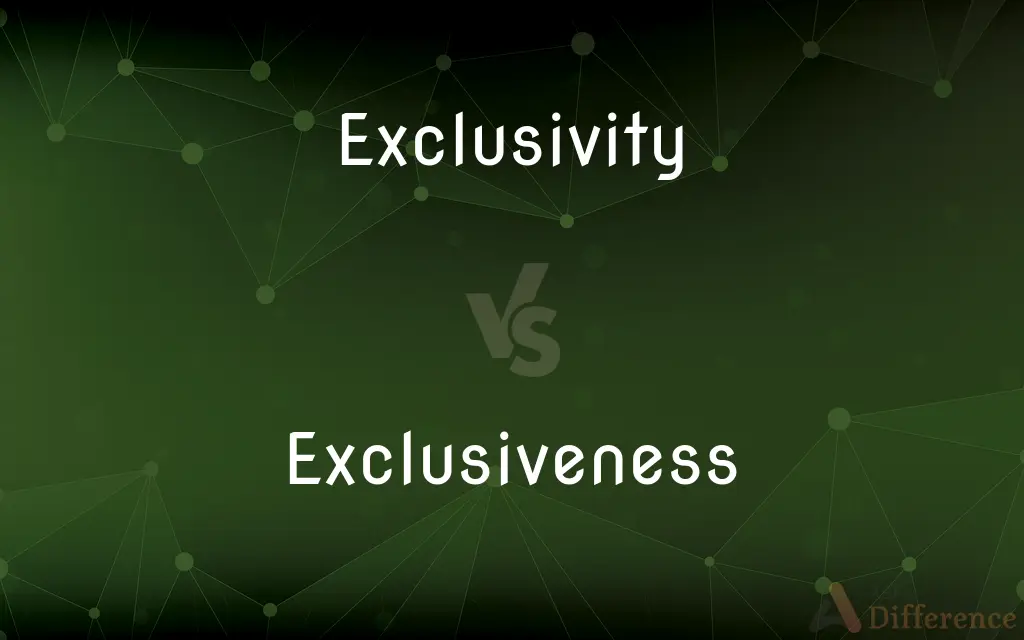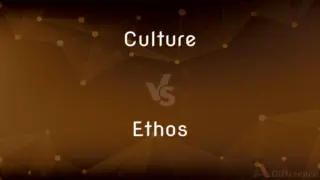Exclusivity vs. Exclusiveness — What's the Difference?
By Tayyaba Rehman — Updated on October 31, 2023
Exclusivity refers to the state or policy of being exclusive, while exclusiveness is the quality or condition of being exclusive.

Difference Between Exclusivity and Exclusiveness
Table of Contents
ADVERTISEMENT
Key Differences
Exclusivity is often used in legal and commercial contexts, denoting a scenario where rights or privileges are restricted to certain parties. Exclusiveness, however, speaks to the inherent characteristic of being exclusive, which can refer to social settings or attitudes that foster exclusion.
In agreements, exclusivity refers to binding terms that limit interactions or transactions to the involved parties. Exclusiveness can be observed as the nature of a group or setting that is selective or restrictive, emphasizing a distinction from inclusivity.
The term exclusivity is applied to contractual or formal arrangements, such as exclusive contracts between manufacturers and suppliers. Exclusiveness may manifest in the form of social cliques or elite gatherings, demonstrating a high threshold for acceptance or membership.
While exclusivity could be temporal, attached to the duration of a contract or agreement, exclusiveness is a broader trait, potentially describing a persistent state of a group or establishment. The exclusivity of a deal might expire, but the exclusiveness of a country club may remain constant.
Exclusivity can be granted or revoked, implying control over who is included or excluded from a service, product, or right. Exclusiveness typically describes the overall aura or atmosphere that arises from being exclusive, shaping perceptions and experiences of those inside and outside the boundary.
ADVERTISEMENT
Comparison Chart
Primary Context
Commercial, legal agreements.
Social settings, inherent qualities.
Application
Specific arrangements or deals.
General trait or condition.
Temporality
Can be limited in duration.
Often a persistent state.
Usage Example
Exclusive rights or distribution deals.
Exclusive clubs or social circles.
Implication
Policy or practice of excluding others.
Quality of being selective or elite.
Compare with Definitions
Exclusivity
Legal right
The contract granted exclusivity for selling the product in the region.
Exclusiveness
Discriminating condition
Exclusiveness was a hallmark of the upscale neighborhood.
Exclusivity
Sole privilege
The artist retained exclusivity over his music.
Exclusiveness
Selective nature
The exclusiveness of the society made it difficult to join.
Exclusivity
State of being exclusive
The exclusivity of the club made it more desirable.
Exclusiveness
Excluding others
Their exclusiveness often led to feelings of isolation.
Exclusivity
Unique possession
She enjoyed the exclusivity of her designer handbag.
Exclusiveness
Elite quality
The restaurant's exclusiveness was apparent in its dress code.
Exclusivity
Restricted access
Exclusivity to the event was ensured through invite-only tickets.
Exclusiveness
Excluding or tending to exclude
Exclusive barriers.
Exclusivity
Excluding or tending to exclude
Exclusive barriers.
Exclusiveness
Not allowing something else; incompatible
Mutually exclusive conditions.
Exclusivity
Not allowing something else; incompatible
Mutually exclusive conditions.
Exclusiveness
Not divided or shared with others
Exclusive publishing rights.
Exclusivity
Not divided or shared with others
Exclusive publishing rights.
Exclusiveness
Not accompanied by others; single or sole
Your exclusive function.
Exclusivity
Not accompanied by others; single or sole
Your exclusive function.
Exclusiveness
Complete; undivided
Gained their exclusive attention.
Exclusivity
Complete; undivided
Gained their exclusive attention.
Exclusiveness
Not including the specified extremes or limits, but only the area between them
10-14, exclusive.
That is, 11, 12, and 13.
Exclusivity
Not including the specified extremes or limits, but only the area between them
10-14, exclusive.
That is, 11, 12, and 13.
Exclusiveness
Excluding some or most, as from membership or participation
An exclusive club.
Exclusivity
Excluding some or most, as from membership or participation
An exclusive club.
Exclusiveness
Catering to a wealthy clientele; expensive
Exclusive shops.
Exclusivity
Catering to a wealthy clientele; expensive
Exclusive shops.
Exclusiveness
(Linguistics) Relating to or being a first person plural pronoun that excludes the addressee, such as we in the sentence Pat and I are in town, so we can meet you for lunch.
Exclusivity
(Linguistics) Relating to or being a first person plural pronoun that excludes the addressee, such as we in the sentence Pat and I are in town, so we can meet you for lunch.
Exclusiveness
A news item initially released to only one publication or broadcaster.
Exclusivity
A news item initially released to only one publication or broadcaster.
Exclusiveness
An exclusive right or privilege, as to market a product.
Exclusivity
An exclusive right or privilege, as to market a product.
Exclusiveness
The state of being exclusive; exclusivity.
Exclusivity
The quality of being exclusive.
Exclusiveness
Quality of being exclusive.
Exclusiveness
Tendency to associate with only a select group
Exclusiveness
High level of distinction
The school's exclusiveness was due to its stringent admission criteria.
Common Curiosities
Does exclusiveness have to be restrictive?
By definition, exclusiveness involves some level of restriction or selectivity.
Can exclusivity be temporary?
Yes, exclusivity often relates to temporary agreements or contracts.
Is exclusiveness a social concept?
Exclusiveness is often associated with social settings where certain groups are selective about membership.
Can exclusivity be bought?
Yes, exclusivity can sometimes be obtained through purchasing rights or access.
Can a brand have exclusiveness?
Yes, a brand can cultivate exclusiveness through marketing and positioning.
Is exclusiveness always intentional?
Exclusiveness can be both intentional and unintentional, depending on the context.
How does exclusivity affect competition?
Exclusivity can limit competition by restricting who can participate in certain activities or markets.
Does exclusivity always have legal implications?
Often, but not always, as exclusivity can also refer to less formal exclusive arrangements.
What is an example of exclusiveness in daily life?
Private lounges at airports demonstrate exclusiveness by serving only certain passengers.
Can a product have exclusivity?
Yes, products can have exclusivity in terms of where or how they are sold or distributed.
How is exclusivity enforced?
Exclusivity is enforced through contracts, policies, or agreements.
Can exclusivity be a marketing strategy?
Absolutely, companies often use exclusivity to increase demand for products or services.
Is exclusiveness a cultural phenomenon?
Yes, exclusiveness can be seen in cultural norms and practices that delineate who is included or excluded.
Can exclusivity and exclusiveness coexist?
Yes, exclusivity in practice can contribute to the exclusiveness of an entity or group.
Does exclusiveness imply superiority?
Exclusiveness often carries connotations of superiority or prestige.
Share Your Discovery

Previous Comparison
Culture vs. Ethos
Next Comparison
Commend vs. CommandAuthor Spotlight
Written by
Tayyaba RehmanTayyaba Rehman is a distinguished writer, currently serving as a primary contributor to askdifference.com. As a researcher in semantics and etymology, Tayyaba's passion for the complexity of languages and their distinctions has found a perfect home on the platform. Tayyaba delves into the intricacies of language, distinguishing between commonly confused words and phrases, thereby providing clarity for readers worldwide.














































